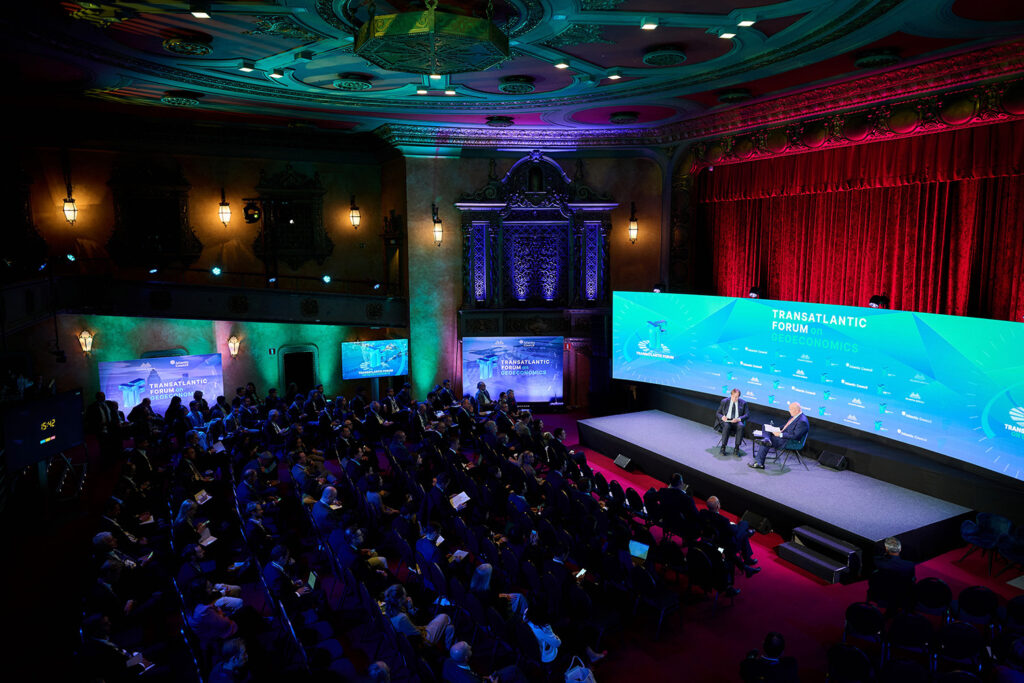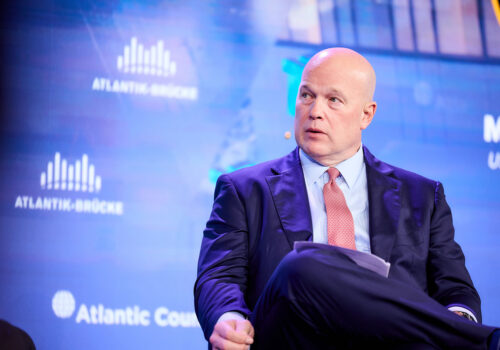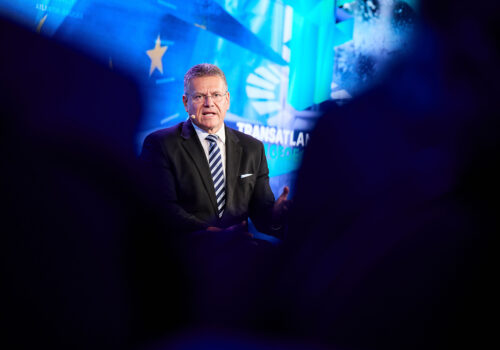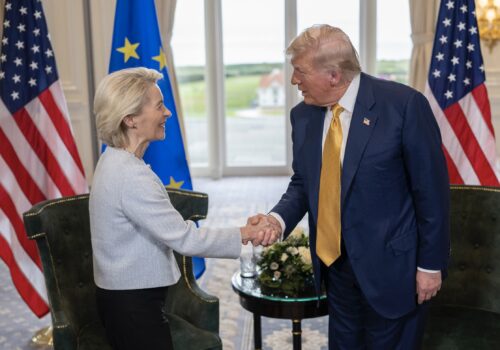A new US-Europe relationship is taking shape.
Over the past year, the economic and security environment shared by the transatlantic partners has rapidly changed. With the return of the Trump administration, the United States launched a trade war—that led to a trade deal—with the European Union (EU). Meanwhile, Washington has continued to press NATO allies to increase their defense spending, as Russia’s war in Ukraine carries on and its incursions into European airspace accelerate.
Amid such headwinds for the US-Europe relationship, our experts flew to Brussels for the Transatlantic Forum on GeoEconomics to hear from US and EU leaders on their visions for enhancing US-European cooperation on trade, security, technology, and other era-defining issues. Below are highlights from the forum, hosted by Atlantik-Brücke and the Atlantic Council’s GeoEconomics Center and Europe Center.
Learn more
Matthew Whitaker’s message to NATO allies: ‘Start spending money’ on defense ‘and stop buying Russian energy’
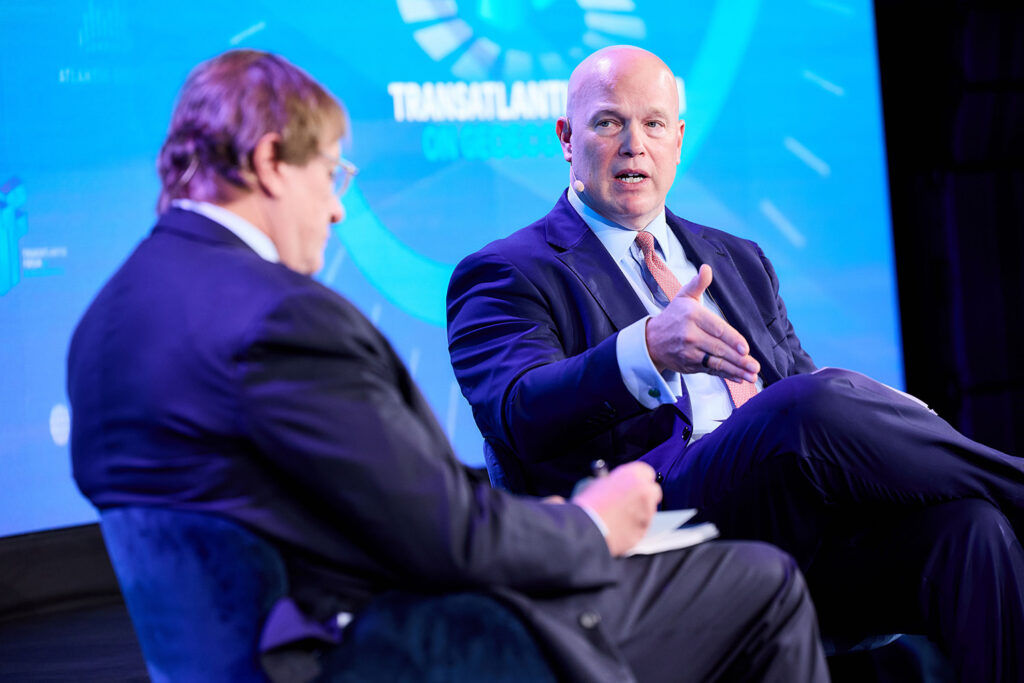
- As Europe continues to face increasing threats from Russia, the United States “remains committed to NATO and to defending every inch of NATO territory,” but “there are still issues to address,” said US Ambassador to NATO Matthew Whitaker.
- In a conversation with Atlantic Council President and CEO Frederick Kempe, Whitaker said that “the ball is in the court of the European and Canadian allies” to address these issues: “Every single ally needs to start spending money on their defense and stop buying Russian energy.”
- Whitaker said that if Europe’s purchases of Russian energy continue, then “sanctions”—including the package currently under consideration in the US Congress—“aren’t going to ultimately have as much bite.”
- On defense spending, “The Hague defense commitment was a good start,” Whitaker said, referring to the agreement at this year’s NATO Summit by allies to spend 5 percent of gross domestic product on defense and defense-related needs. “But, unfortunately, I think some of our allies are dragging their feet, and they need to pick up the pace.”
- Whitaker pointed to Spain and Italy as examples of countries that still need “to get serious” on defense spending. At the same time, he said that Germany’s ability to meet the spending targets in the next four years is “good news.” Meanwhile, Whitaker argued that France and the United Kingdom have the “desire” to spend more, “but the economics are just not there,” and their “borrowing capacity is not really going to cover what they need to do.”
- As Russia continues to violate the airspace of European countries, Whitaker argued that NATO’s response has proven that the Alliance is “serious and ready to move.” Still, he said, NATO can do better to maintain a “multilayered” air defense that ensures allies are “not firing two-million-dollar missiles to shoot down six-hundred-dollar Shaheds.”
- “A lot of people think that somehow these challenges that Russia presents to us somehow demonstrate our weakness. It’s quite the opposite,” Whitaker said. “We’re all over every single one of these threats.
- “In an uncertain world, we can only have peace through strength,” Whitaker said. “If the whole team is strong and there’s no weak link, then that strength is what’s going to ensure peace, and no one will challenge that strength.”
Watch the conversation
EU trade chief Maroš Šefčovič: US-EU trade deal better than ‘full-scale trade war’
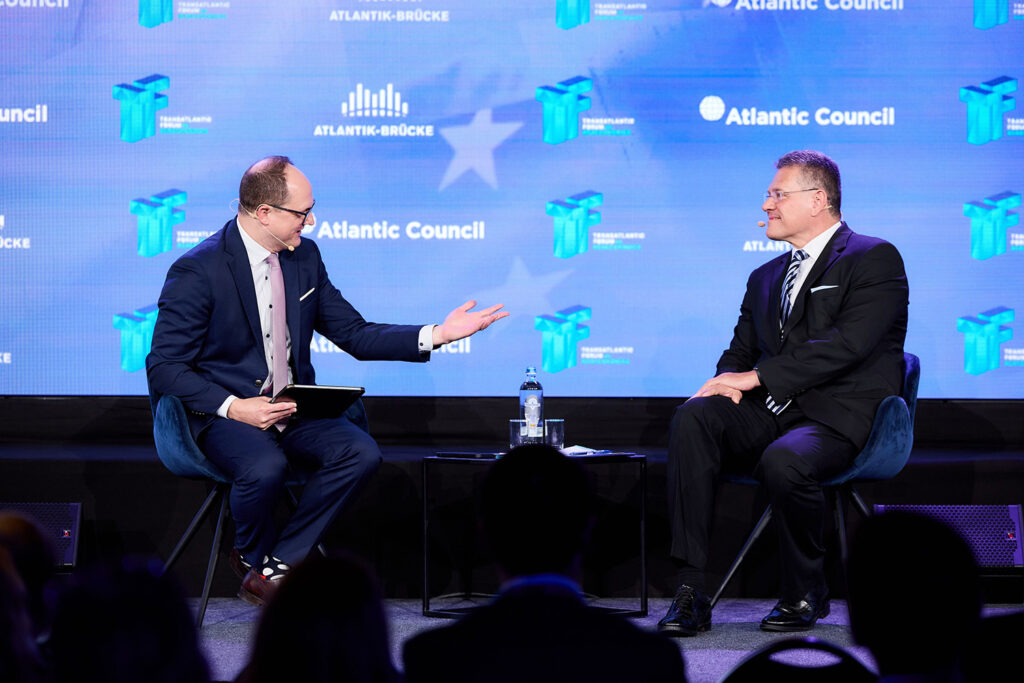
- “Global trade will not go back” to the era before US President Donald Trump unveiled a sweeping package of tariffs on April 2, Šefčovič said, in conversation with Atlantic Council Europe Center Senior Director Jörn Fleck. “So, all those who are longing for the world of the past, they’re losing time” to adjust to a new order.
- The first way to adjust, he said, is to secure deals with the United States and continue to revisit the US-EU trade relationship, in what Šefčovič called “permanent relationship management.”
- But, he added, he hopes that every time the $1.7 trillion per year US-EU trade relationship is revisited, it would not be a “huge political issue” and that disputes would be resolved swiftly.
- Šefčovič argued that the US-EU trade agreement solidified in August, which set a maximum for US tariffs on EU goods at 15 percent, is the “best possible deal,” especially considering the alternative: “Would we be better off with a full-scale trade war?”
- With questions arising about Trump’s recent announcement of 100 percent tariffs on foreign brand-name drugs, Šefčovič said that the EU “should be shielded from the incoming very high tariffs on pharmaceuticals” by the 15-percent ceiling.
- While Trump has applied 50 percent tariffs to steel and aluminum, Šefčovič argued that “we are not each [other’s] problems” when it comes to steel, considering that US-EU steel trade is relatively low and the EU exports a specialized steel that the United States needs. His solution: “A tariff rate quota” with “very low or zero tariffs.”
- Yet, at the same time, the EU is adjusting to the new trade order in two other ways, Šefčovič explained. The first is diversifying its trade relationships—pursuing tighter ties with countries such as Japan, Mexico, Australia, the United Arab Emirates, and India. “With all these partners, we can progress significantly this year,” he said.
- The second is working to reform multilateral institutions such as the World Trade Organization so that they can best respond to today’s trade challenges, from overcapacities to illegal subsidies—”otherwise this rule-based global order would be under more and more pressure,” Šefčovič warned.
Watch the conversation
US Ambassador to the EU Andrew Puzder: ‘We need Europe strong’ as a partner for trade and defense
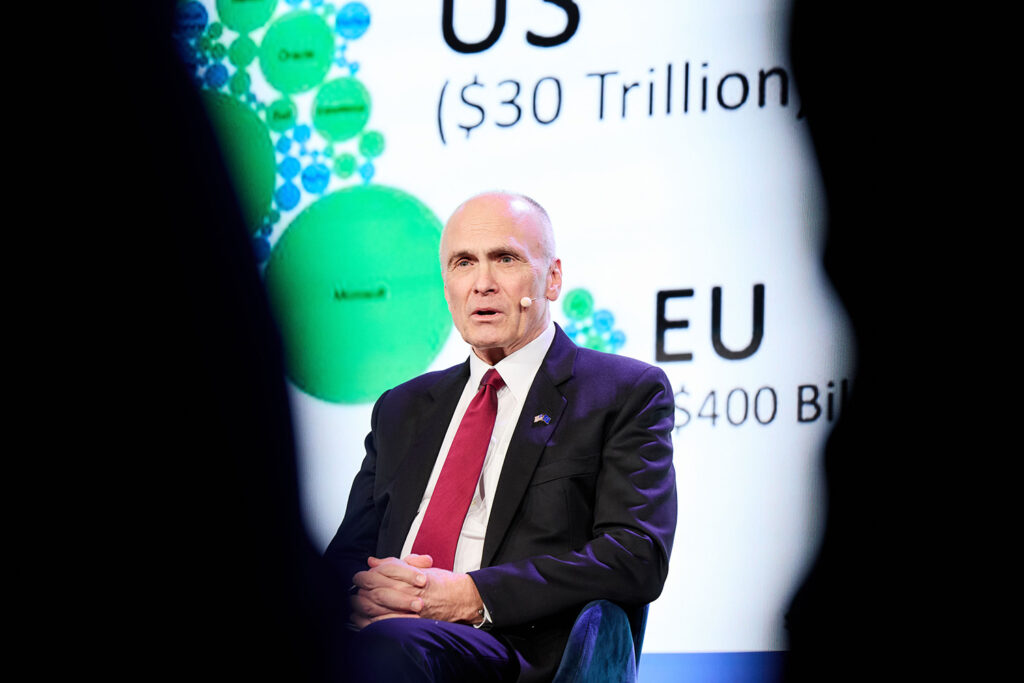
- For years, Europe’s economy was “based on a three-legged stool,” made up of defense costs covered by the United States, “cheap Russian energy, and a retail market in China that seemed like it would never go away,” Andrew Puzder, US ambassador to the EU, told Kempe. Now, he said, “we’ve seen that three-legged stool collapse,” after Russia’s full-scale invasion of Ukraine, Washington’s defense priorities shifting to Asia, and China’s consumer market weakening.
- It is in the best interest of the United States “to have an economically strong Europe,” said Puzder. “We need Europe strong for trade purposes,” as well as for “defense purposes so they can cover their defense costs” and “can help us in other troubled parts of the world,” he said.
- “Europe got a really good deal,” said Puzder of the recent US-EU trade agreement. “I know that’s not the popular opinion here” in Brussels, he acknowledged.
- But he argued that Europe would benefit from increasing its purchases of energy from the United States and noted that the 15 percent tariffs and investment commitments were more favorable for Europe than the deals the United States struck this year with South Korea and Japan. “I’m hoping that gets ratified in the European Parliament,” he said.
- Puzder described some remaining areas of disagreement between the United States and EU, including nontariff trade barriers and EU regulations under the Digital Services Act and Digital Markets Act, which the Trump administration views as discriminatory against US companies.
- Washington needs to ensure that the Digital Markets Act is “not intended to penalize companies because they’re American and large,” Puzder said. “If that’s the intent, then that’s an issue we need to address. That’s not the way you treat allies.”
- “If Europe’s going to enter the AI age,” its policymakers “need to start looking at the problem of energy in the future,” said Puzder, arguing for an approach to energy policy that emphasizes a US framing of “energy abundance” over a European emphasis on “energy efficiency” or “energy cleanliness.” With artificial intelligence (AI), he said, “you’ve got a whole new incredible energy demand going forward that you really need an all-of-the-above approach to energy to meet.”
Watch the conversation
European Commission Executive Vice-President Teresa Ribera: The EU must stick to its climate goals to remain competitive
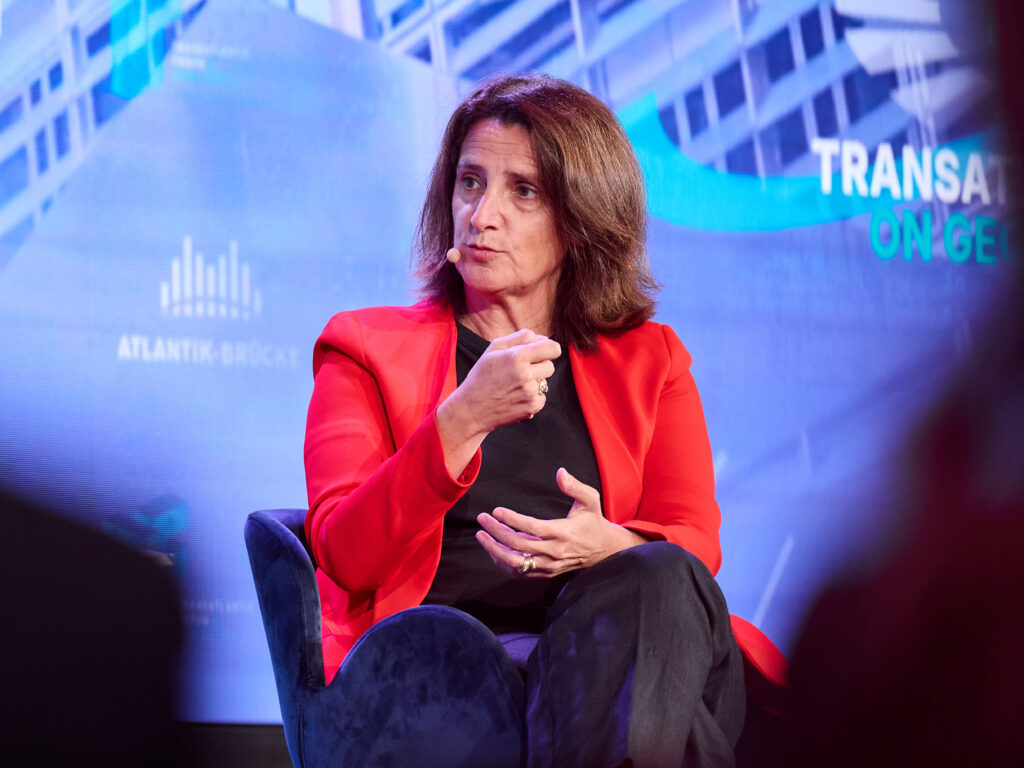
- Teresa Ribera, European Commission executive vice-president for a clean, just and competitive transition, said that it “has not been particularly easy” to keep good relations between the EU and United States this year.
- In a conversation with Bloomberg News Brussels Bureau Chief Suzanne Lynch, Ribera explained that the EU always regarded the United States as a “real partner” in building global governance, innovating, and ensuring that trade flows smoothly. “We have . . . learned that we need to develop and count on our own capacities,” she said. “It has been kind of a shock.”
- After the EU placed an antitrust fine on Google earlier this month, Ribera said she does not believe that the EU’s regulatory oversight will damage US-EU relations, because such antitrust measures are in line with US principles around protecting against monopolies. The US and EU have the same goal, she said, “which is to ensure that things work well, that the level playing field is respected, that innovation is not being killed, and that consumers are protected.”
- Ribera said that as AI competition ramps up, the EU will encounter “new challenges” related to its energy consumption and data privacy measures. She called for the EU to build the governance capacity needed to ensure that AI development “does not create additional distortions.”
- She acknowledged that while the EU may not be known for its speed in crafting new regulations, it is “reliable, stable, predictable: Things that others may be missing.”
- She added that with China moving at “high speed” in producing its own technological breakthroughs, it will be important for the EU to consider how it maintains a labor force, investment pool, and business capacity to provide its own tech solutions, such as in clean energy.
- On these clean-energy solutions, “the United States seems to be backtracking,” Ribera said, and “it’s not helpful for the technology breakthroughs that still need to happen”—although the US private sector and state-level leaders are still showing up, she noted. “There may be lots of new things happening at smaller scale,” but they add up to “quite a big amount of modernization of the American economy,” she said.
- As the EU looks to remain competitive, Ribera said that she will be focusing on “driving the single market,” which she highlighted as one of the EU’s unique strengths. She also stressed the importance of EU members continuing to keep to the union’s climate goals through innovation, as doing so “is the only way to become competitive and to keep on creating wealth.”
Watch the conversation
EU Commissioner Valdis Dombrovskis: A digital euro is likely six years away
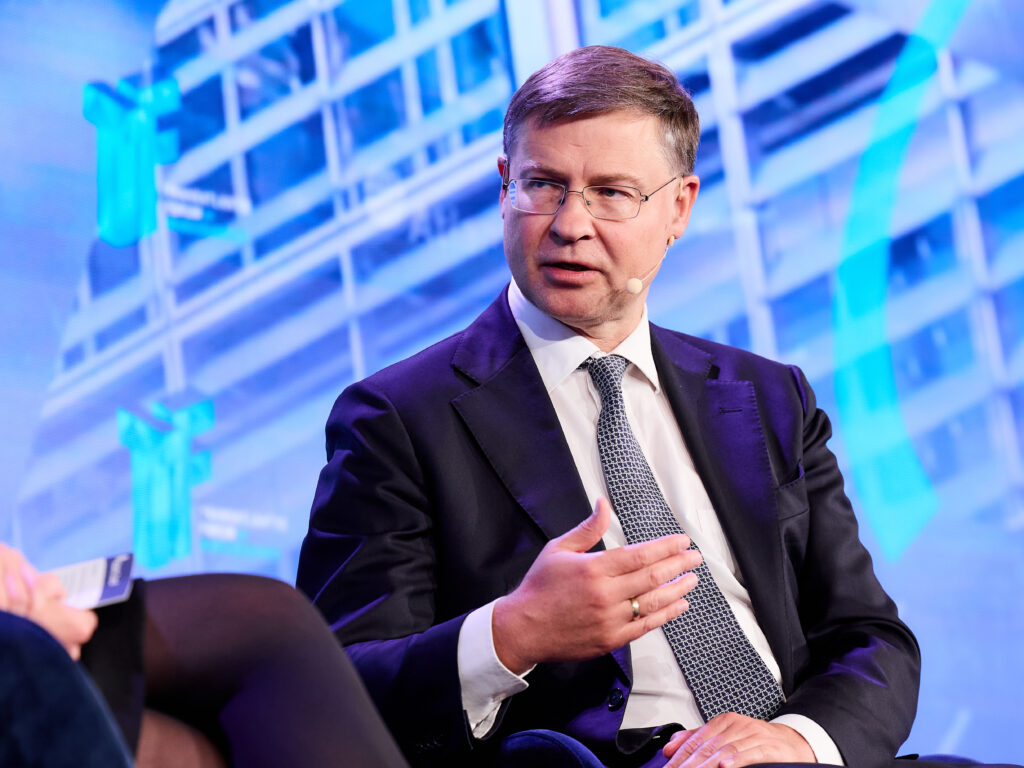
- With the geopolitical situation “getting more complicated,” the European Union has had to “reassess” its role as an institution, especially on security and defense, said Valdis Dombrovskis, European commissioner for economy and productivity.
- Dombrovskis told Atlantik-Brücke Chief Executive Officer Julia Friedlander that while the European Union began as a “peace project,” it has had to take on new “tasks” and “competencies” as war returned to the continent. He pointed to the ReArm Europe Plan, which aims to provide an additional 800 billion euros in defense spending over four years.
- Yet, he argued, the European Commission still respects a “certain division of competencies” when it comes to defense, considering NATO’s prerogatives.
- Regarding the US-EU relationship, Dombrovskis said that the two sides are “strategic allies” and that it is important that they work together in a more “conflictual geopolitical situation” in which “autocracies are trying to assert themselves.”
- Dombrovskis, who is also the European commissioner for implementation and simplification, also spoke about the Commission’s effort to simplify EU laws and regulations, which he said would save billions of euros per year and would help the EU with its “competitiveness agenda.”
- He said to expect new proposals over the next few months to simplify regulations related to digital matters, the environment, chemicals, and cars. Such simplifications are “equally important” for European companies and US companies working in Europe, he said. “Often they point to the same problems and issues to be resolved.”
- Dombrovskis said that while the European Commission has made “slow and steady progress” on a digital euro, “it’s important now to accelerate” that work.
- He explained that right now, the European Commission, European Council, and European Parliament are each finalizing their approaches to central bank digital currencies and should discuss them next year. After that, it will be “some five years before the actual introduction of the digital euro,” he said.
Watch the conversation
Further reading
Tue, Sep 30, 2025
US Ambassador to NATO Matthew Whitaker’s message to allies ‘dragging their feet’ on defense spending
Transcript By
At the 2025 Transatlantic Forum on GeoEconomics, Whitaker called upon each ally to "start spending money on their defense and stop buying Russian energy."
Tue, Sep 30, 2025
EU trade chief Maroš Šefčovič on why Europe got the ‘best possible’ trade deal with the United States
Transcript By
Šefčovič argued at the 2025 Transatlantic Forum on GeoEconomics that it makes sense for the US and EU to be in constant discussion about their trade practices and tariffs, considering the size of their economies.
Mon, Aug 11, 2025
The US-EU trade agreement is not set in stone. This presents pitfalls and opportunities.
New Atlanticist By Charles Lichfield
The trade and tariff deal recently struck in Scotland has several important elements that are yet to be determined.
Image: Atlantic Council President and CEO Frederick Kempe speaks with US Ambassador to NATO Matthew Whitaker at the Transatlantic Forum on GeoEconomics on September 30, 2025.
